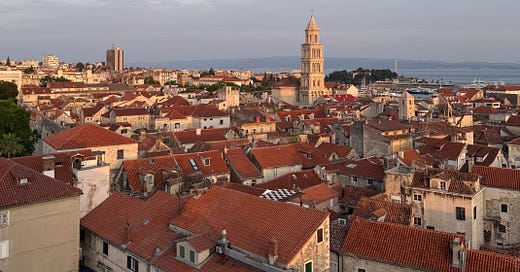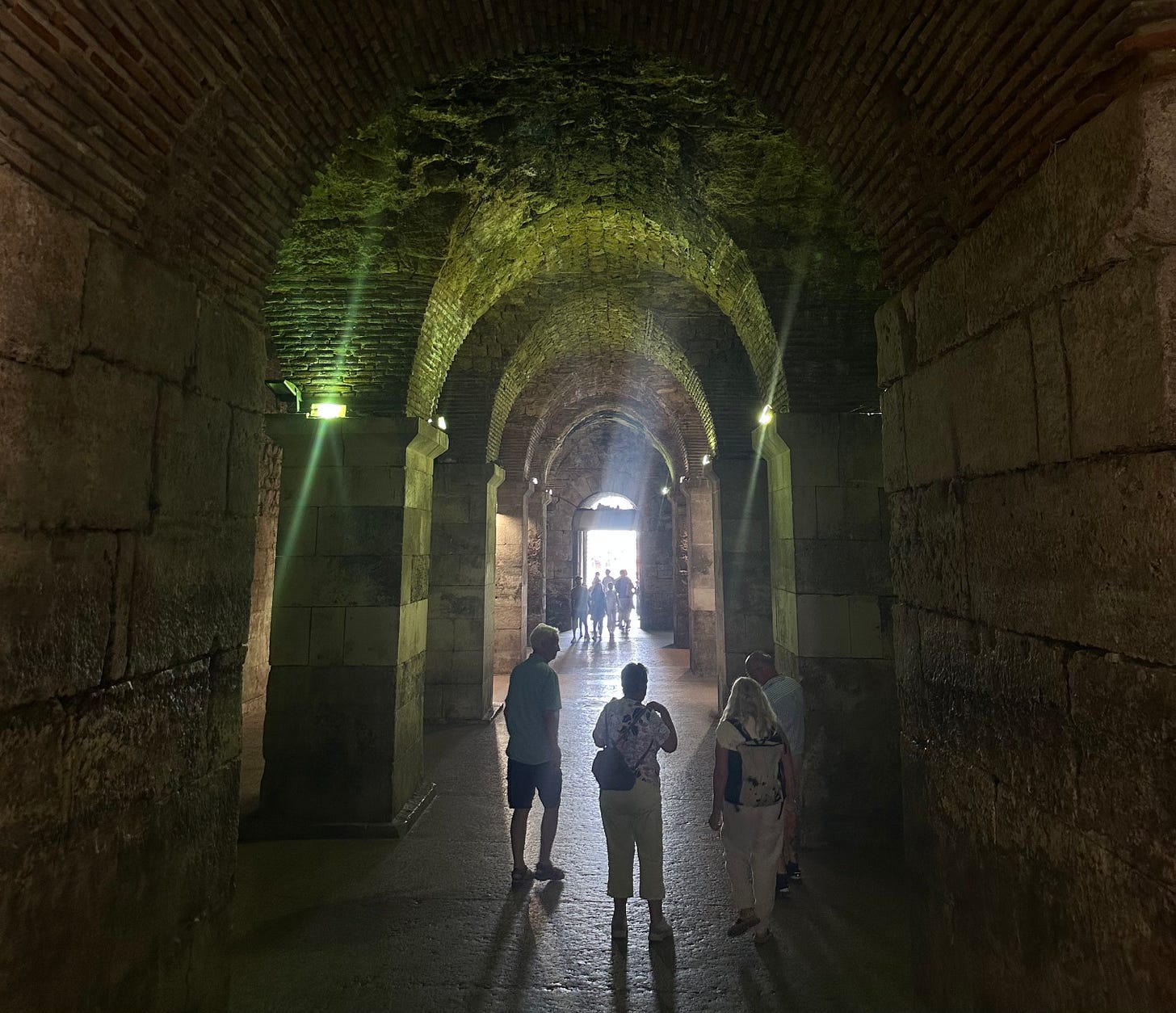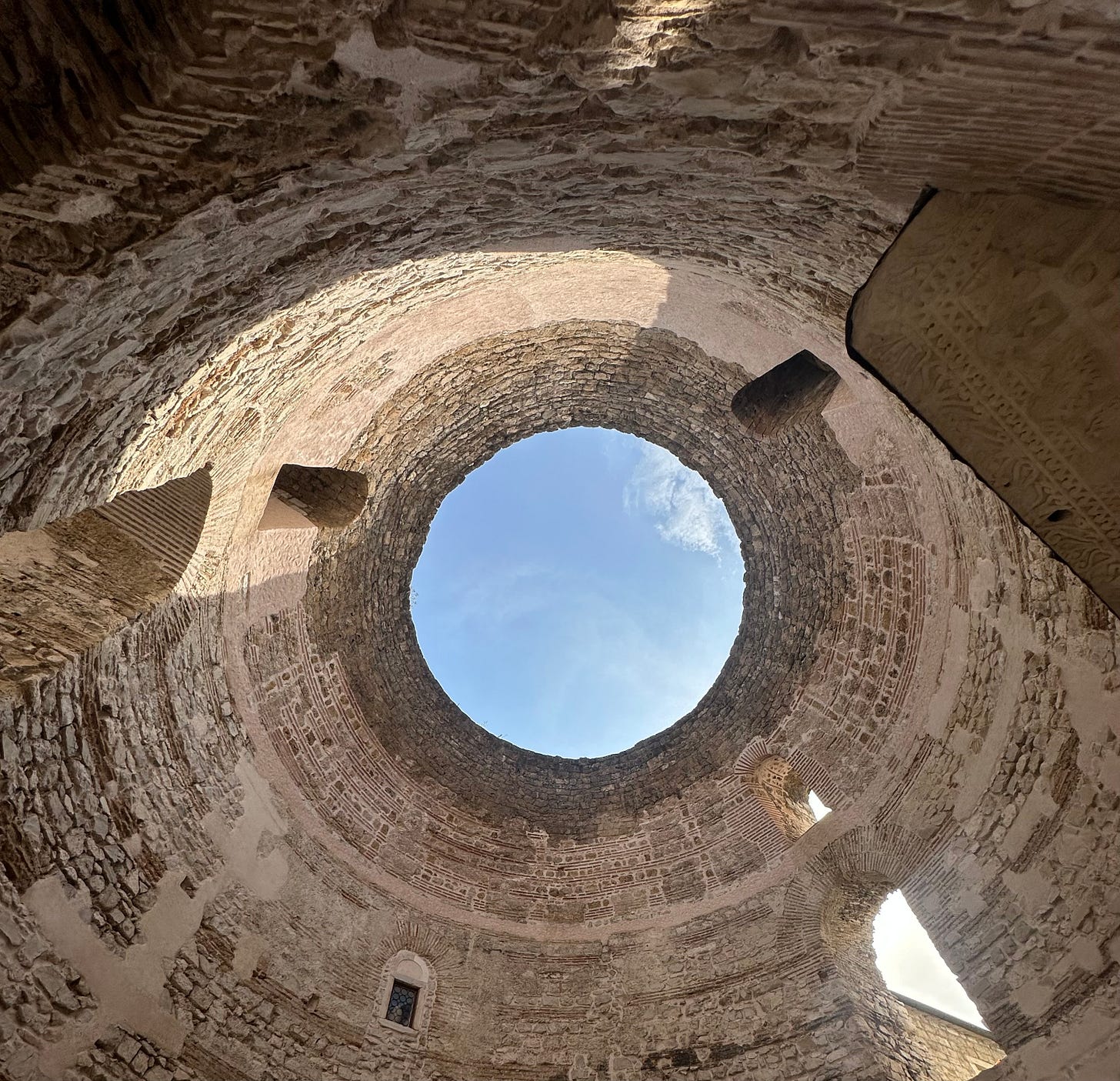I’ve always been better at estimating time than distance. I always know how long it’ll take me to get ready, how long it’ll take to commute to a familiar location at a familiar time of day. If you want to eat at 7:30, I know when I should begin peeling the onions. I have made accurate guesses of how long relationships will last, of how long it’ll take me to finish a book. I feel very confident in my assessment of a minute, or fifteen, or thirty.
Distance, on the other hand, is a mystery. If you ask me how many miles there are between two cities, I’ll draw a blank. When I was living in New York, I met a girl from Minnesota and told her it must be nice not to be so far from home, to which she nodded her head slowly and uncertainly. When I was little, I thought that planes remained stationary while the background outside changed, like an old-school movie. 400 miles, 4,000 miles - there is a difference between those distances, but it’s not one you can feel physiologically. Time is an entity that’s easy to imagine in units of measurement. Time drips, thick like honey, and runs, fast like blood. It’s something you can sense spilling or filling a space or a cup. Time’s slowness, time’s briskness - they’re the kind of weights that fall heavy as a dumbbell on your chest, jolting you awake in the middle of the night.
My boyfriend and I lived in different cities for over two years. “Long distance relationship” didn’t feel as accurate as “limited time relationship.” As soon as one person’s plane landed in the other’s city, the clock began, its hands always moving too fast. When apart, the clock slowed to a crawl, its hand trudging through molasses. Who’s to know how many miles are between Seattle and Los Angeles - that distance doesn’t affect how short a weekend can feel, how long it takes for thirty days to pass. I’d start feeling sad as soon as he picked me up from the airport, stomach already knotted at the thought of the impending goodbye.
A long distance relationship is less about managing distance than it is about managing impatience. The only way one can survive such an emotionally fraught state of affairs is by having some kind of end goal in mind - at least that’s the only way I could survive it.
As I grow older and my long-term relationship grows longer, I’m realizing that La La Land (2017) isn’t a story about the right people meeting at the wrong time, so much as it is a story of people passing through each other’s lives at a critical point: on the precipice of achieving their dreams. They needed one another to take their respective creative leaps, and they certainly were in love. But they weren’t willing to suffer to make it work. It takes a different kind of mutual love - and perhaps a masochistic personality - to withstand buffered FaceTime calls and long periods between texts and nausea-inducing heartsickness. It takes an acute understanding of time and sacrifice - a willingness to forgo time in the immediate future in the service of the many years to come. It requires walking several paces backwards and looking at the painting in its entirety instead of fixating on the details. It’s not a storm that every relationship can or should survive.
Time is on my mind on the flight from Seattle to Amsterdam. I am going on an international trip with my family for the first time in six years. The last time we traveled abroad together, I was a lovesick, emotionally immature eighteen-year-old, which is the last thing I ever hoped to be at eighteen. I couldn’t fathom being apart from my boyfriend for more than a week, especially on the precipice of our “going long distance.” I cried on the Eurostar from London to Paris and filled up about ten pages of my journal in a courtyard in Florence. These were some of the most embarrassing emotions I had ever felt, and they felt embarrassing in real time, but I had no way to intellectualize them yet. The tears and feelings flowed through me like raindrops on a pane of glass. I, myself, was as transparent as glass, and everyone in my family couldn’t have been more annoyed. I didn’t want to fall in love at that age, and though I’m better because of it, I can’t recommend it to anyone in good conscience.
I’m feeling much more stable this time around. And it’s in this stability that you can measure the time that’s passed. I contain more weight than I did six years ago - more physical and emotional heft. It takes a stronger force to knock me down in all regards. My face and body are a ledger - a smooth stone wall with tally marks, recording the time that’s passed.
In Amsterdam, the older women also contain this heft. Many of them are tall, like me, and contain lines on their face that serve to measure the time. They drink more wine than they do water, and they greet each other loudly in the bistros, sharing an order of fries and speaking with direct gazes. If they own cell phones, you wouldn’t know it. At one cafe, I watched a woman devour half an artichoke, two croquettes, and a glass of rosé before her date arrived, only for her to order more drinks and food after he took his seat at the table. These women don’t have the desire to be ephemeral, as the women I’ve grown up around in suburban America do; they don’t wish to haunt or waft. You can feel their joyfulness as soon as they set foot in the restaurant, their delight in filling up the space.
It’s late June in Amsterdam, so the sun stays out past 10 PM. It doesn’t feel right to go back to the hotel after dinner with the sun still out, so we walk along the canal until we find a pub to pop into. We’re bound to make at least a couple of social gaffes while abroad, and our first one happens now when we try to order cocktails in a pub. A tinge of embarrassment, but they could already guess we’re Americans the second we opened our mouths. You can read it in the apologetic way we carry ourselves. And in the way we interact with the waiter, him sweating in his collared shirt and black tie, pen and pad of paper at the ready. He doesn’t want to tell us how his day is going; he wants to take our order so he can finish his shift and enjoy his day. He doesn’t live to work as we’re meant to.
The second gaffe happens the following night at dinner when my mom tells the Dutch waitress that my sisters and I are Dutch. “But where do you live?” the waitress asks, her English broken. “In America. Our grandparents are just Dutch,” I correct. “Ah,” the waitress remarks. “Then I am French.”
Time is a flat circle in late June in Amsterdam - the daylight is greedy. It’s nearing 11 at night, and the sky is just beginning to melt into twilight. Red-faced men with beer bellies drink at standing tables. The bottles of wine they’ve consumed line up along the pavement, but they barely stumble. Several of them mosey to a nearby bridge over the canal to share a moment of tenderness. They hold their wine glasses in one hand and sling their other arm over the other’s shoulders in a tight embrace. They hold each other cheek to cheek, whispering in each other’s ears.
Bold women, functional old men alcoholics - all things that would be gauche in the United States, but that are romantic to an American in Europe. Before boarding our flight to Split, my little sisters ask me how Europeans perceive the United States, culturally. I’m in no way qualified to speak on behalf of all of Europe, but these are my little sisters, so I create the truth for them. “Cowboys,” I say. “They see us as cowboys. Cowboys, Hollywood, and New York City.” All the other stuff is implied.
Split, Croatia, is a town that likes to party, set against the backdrop of the turquoise Adriatic Sea and Diocletian's Palace, an ancient Roman palace built at the end of the third century. I’m usually good at understanding time, like I said, but it’s hard to comprehend that my Tevas are gracing 1,700-year-old stone floors. British and American tourists, drunk off Campari, stumble from the Riva promenade through the palace cellars, their iPhones lighting the way. Time marches on, but the Palace - protected by UNESCO - digs in its heels.
Americans are forced to rethink time abroad. We hail from a country of convenience - of takeaway coffees and Trader Joe’s. A country that’s been around for a fraction of the time that single cities have been around elsewhere. The bill at the cafe arrives when it arrives. It’s hardly convincing that I’m comfortable with my arms uncrossed, with my pace slowed. The streets I walk daily at home are far less traveled than those I am walking across now, and it shows.
At after-dinner drinks, my youngest sister tells my middle sister and me that, unlike the two of us, she’s not trying to be European. I assure her that I’m not trying to be European, I just like wearing long skirts lately. “I’m just American af,” she confesses. When we ask her why, she says to look at her, look at us. We just are.
Across the pond, timespace bends, the third century and the twenty-first, at their respective ends of a horseshoe, kiss. Smart phone-illuminated cobblestones. Americans emancipating themselves from Europe, only to spend their summers glimpsing some of its charm. The background outside the airplane changes, the vehicle remains stationary.









I am currently in Europe for the first time as an American, and wow. Relatable! I love how you've phrased the differences between everyday life in Europe and America. Many things that bring so much joy to the people here are looked down on in America, and it just does not make sense. I have had many similar thoughts and feelings in my travels, and it is great to see an American voice those feelings like this. Thank you!
I like this. Travel as a means of conceptualizing a different relationship to time, even as the traveler instinctively knows that they cannot fit within that timescale, that time for them will always be experienced at a different velocity. Time is both objective and highly subjective, and our relationship to time defines much of how we perceive the world.
Do we travel to see new places, or to allow ourselves to imagine what life would be like if our relationship to time was more forgiving, and if we were more forgiving to ourselves? We often feel in our hearts that some other version of ourselves existed on trips abroad and time spent in different cultures that we wish we could reconnect with. Maybe what we are missing is the spirit of forgiveness in which we held ourselves during those trips.